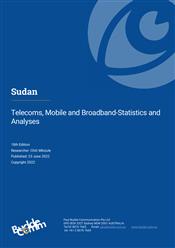Sudan Telecoms Market Report
Telecoms, Mobile and Broadband - Statistics and Analyses

WE-Africa-NA terrestrial fibre cable set to improve internet connectivity
Sudan emerged as a poorer country when South Sudan separated from it in 2011. Although Sudan has about four times the population of South Sudan, the latter benefits from its control of the majority of known oil reserves. The Sudanese economy has been affected by hyperinflation in recent years, partly the result of the loss of oil revenue but also due to domestic volatility and social unrest.
The country entered into a transitional administrative period in August 2019 following protests against authoritarian rule, which had included media and internet censorship. Hopes for a smooth political settlement were dashed in late 2021 when a military coup replaced the transitional government, and many political leaders were placed under house arrest. Elections have been announced for July 2023, though much political horse trading needs to be accomplished before such elections can be taken for granted.
The difficult economic conditions have meant that for several years telcos have reported revenue under hyperinflationary reporting standards. Pressure on revenue has made it difficult for operators to invest in infrastructure upgrades, and so provide improved services to customers. Despite this, the number of mobile subscribers increased 7.% in 20201, year-on-year. This level of growth is expected to have been maintained in 2022, though could slow from 2023 as the acute influences resulting the pandemic begin to wane.
The country’s poor fixed-line infrastructure has helped the development of mobile broadband services. Sudatel, Cameroon’s Camtel, and Chad-based SudaChad Telecom’s planned investment, the WE-Africa-NA terrestrial fibre link, will connect from Port-Sudan then on to Kribi in Cameroon, passing through Chad. The new build aims to respond to rising data demand in all three countries, particularly as usage has been accelerated since the onset of the Covid-19 pandemic with digital and data services gaining traction.
Key developments:
- Zain Group receives bid for its units Zain Sudan and Kuwait Sudanese Holdings for $1.3 billion;
- Zain Sudan planning launch of Zain Passport m--banking app later in 2022;
- MTN contracts Ericsson to use the latter’s mobile financial solutions and IT architecture;
- Military coup triggers a month-long internet shutdown;
- WE-Africa-NA terrestrial fibre cable set to connect Sudan, Cameroon, and Chad;
- Government promotes transition from cash to digital payments;
- Hyperinflation affecting telcos’ revenue reporting;
- Sudatel continues with investment plan;
- Report update includes operator data to Q1 2022, regulator’s market data to Q4 2020, updated Telecom Maturity Index charts and analyses, recent market developments.
Companies mentioned in this report:
Zain Sudan, MTN Sudan, Sudatel, Sudani, Canar Telecom (Canartel), SudaNet, ZinaNet, Thuraya
Related Reports
- Africa - Mobile Infrastructure and Mobile Broadband
- Africa - Mobile Network Operators and MVNOs
- Africa - Fixed Broadband Market - Statistics and Analyses
- South Sudan - Telecoms, Mobile and Broadband - Statistics and Analyses
- Eswatini (Swaziland) - Telecoms, Mobile and Broadband - Statistics and Analyses
- Democratic Republic of Congo - Telecoms, Mobile and Broadband - Statistics and Analyses
- Djibouti - Telecoms, Mobile and Broadband - Statistics and Analyses
- Tunisia - Telecoms, Mobile and Broadband - Statistics and Analyses
- Botswana - Telecoms, Mobile and Broadband - Statistics and Analyses
- Sierra Leone - Telecoms, Mobile and Broadband - Statistics and Analyses
Share this Report
TMT Intelligence
A platform to scale your intelligence tasks
Monitor critical insights with our AI-powered Market Intelligence Platform gathering and analyzing intelligence in real time. With AI trained to spot emerging trends and detect new strategic opportunities, our clients use TMT Intelligence to accelerate their growth.
If you want to know more about it, please see:
Research Methodology
BuddeComm's strategic business reports contain a combination of both primary and secondary research statistics, analyses written by our senior analysts supported by a network of experts, industry contacts and researchers from around the world as well as our own scenario forecasts.
For more details, please see:
More than 4,000 customers from 140 countries utilise BuddeComm Research
Are you interested in BuddeComm's Custom Research Service?
Hot Topics
News & Views
Have the latest telecommunications industry news delivered to your inbox by subscribing to BuddeComm's weekly newsletter.